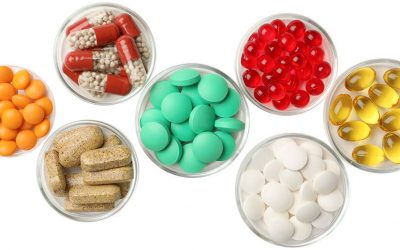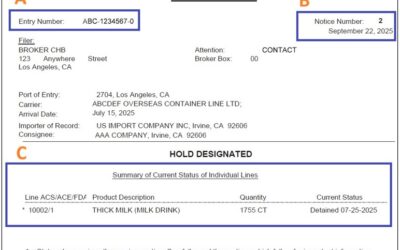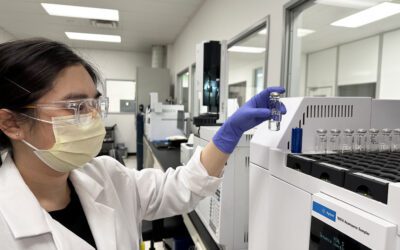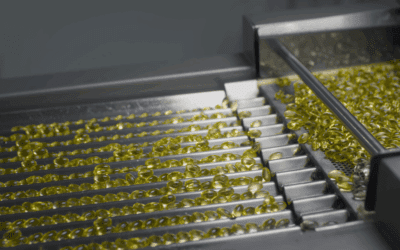Certified Laboratories Blog
Insights for the food & beverage, cosmetics, OTC, supplements, and other industries.
Amazon Supplements Update 2026: What Sellers Need to Know
Reviewed By Steven Taormina, Certified Laboratories VP Sales & Marketing, Cosmetics, OTC, and Supplements; and Shelly Blackwell, Senior Director, Dietary Supplement and Tobacco Consulting, EAS Consulting Group 1-Minute Summary Amazon now requires third-party...
Choosing a Lab for FDA Detention Testing: What Counts with the Agency
1-Minute Summary Pick a lab with an ISO 17025 scope that matches your matrix/analyte; use LAAF when your analyte is active on FDA’s Dashboard. Require validated, matrix-appropriate methods, with LOQ/LOD below the limit and full QC so results are defensible. ...
Dietary Supplement Allergen Control: Why It Matters in Manufacturing
Reviewed by Maged Sharaf, Ph.D., Senior Director for Labeling, Cannabis and Claims Consulting Services, EAS Consulting Group 1-Minute Summary Undeclared allergens are a leading cause of dietary supplement recalls, making proactive control essential. ...
PCR & ELISA Allergen Testing: How Manufacturers Detect Hidden Risks
1-Minute Summary ELISA allergen testing and PCR allergen testing are the two most widely used methods for detecting allergens in food, supplements, and cosmetics. Sandwich ELISA is ideal for protein-based allergens; PCR is preferred when DNA is more stable...
FDA Red List Removal – A Proven Plan for Resolving an Import Alert
Reviewed and Approved by Tim Lombardo, Sr. Dir., Food Consulting Services, EAS Consulting Group; and Annie Hughes, Director, General Manager FDA Detention, Certified Group 1-Minute Summary FDA Red List removal requires proving the issue that caused detention has...
How to Submit Samples for Nutritional Analysis
The time and cost associated with analytical determinations for compliance with the FDA Nutrition Labeling regulations (21 CFR 101) dictate that composites rather than individual samples be used. The following information explains how to submit samples for nutritional...
How Cosmetics Microbiology Testing Supports Product Safety and Quality
1-Minute Summary Cosmetics microbiology testing verifies that products are free of harmful microbes and safe for consumer use. Testing is performed at multiple stages – water, raw ingredients, in-process materials, and finished goods. USP <51>,...
How to Read an FDA Notice of Action (NOA)
Reviewed and Approved by Tim Lombardo, Sr. Dir. of Food Consulting Services, EAS Consulting Group; Annie Hughes, Director, General Manager FDA Detention, Certified Laboratories FDA detentions are on the rise. In 2025 alone, the Agency reviewed nearly 50 million...
Ido-BR1 Testing for Dietary Supplements: New Validated Method
Reviewed and Approved by Matt Traynor, PhD, Vice President, Innovation and Validation, Certified Laboratories 1-Minute Summary Ido-BR1 has shown promise in clinical trials as an anti-inflammatory for joint health, making it a popular ingredient in...
Health Canada’s NHP GMPs 4.0: Stability Testing FAQs
Reviewed and Approved by Matilda Baghdasarian, Laboratory Services Associate Director 1-Minute Summary Health Canada’s NHP GMPs Version 4.0 takes effect March 4, 2026, replacing the 2015 guide. Every natural health product (NHP) must now have a...
Want Accurate Results, Faster? Send Your COA with Your Sample
Reviewed and Approved by Matt Traynor, PhD, Vice President, Innovation and Validation, Certified Laboratories 1-Minute Summary COAs provide key technical details that are often absent from the sample submission form. They help us choose the most...
Bemotrizinol in the U.S. – Why SPF Product Manufacturers Should Prepare Now
1-Minute Summary Bemotrizinol is under FDA review, with the Agency issuing a proposal to add it as a permitted active ingredient in December 2025. Public comment is now open. Globally used in sunscreens, Bemotrizinol offers broad-spectrum protection, high...
Dietary Supplement Component Specifications & Testing Explained
Reviewed and Approved by Shelly Blackwell, Sr. Dir. Dietary Supplements & Tobacco Consulting, EAS Consulting Group 1-Minute Summary The FDA continues to cite failure to verify component specifications as a top observation during inspections. ...
Cosmetic Manufacturers Must Prepare for Proposed Ingredient Bans
Reviewed and Approved by Rasha Abueid, R&D Supervisor, Certified Laboratories 1-Minute Summary Pending U.S. federal legislation could ban 18 ingredients and ingredient classes used in cosmetics. The Toxic-Free Beauty Act headlines the bills and would...
Phil Gillespie Named Chief Financial Officer of Certified Group
New CFO to Support Company’s Growth and TIC Market Expansion SAN ANTONIO, Texas – Sept. 8, 2025 – Certified Group today announced the appointment of Phil Gillespie as Chief Financial Officer (CFO). With more than 30 years of experience in corporate finance, Mr....
Why You Must Verify the Active Vitamin C in Your Cosmetic Products
Reviewed and Approved by Matt Traynor, PhD, Vice President, Innovation and Validation, Certified Laboratories 1-Minute Summary Vitamin C is a popular but unstable compound in skincare, requiring accurate content verification to support label claims. In the...
Measurement Uncertainty (MoU) – Why the ± Matters in Analytical Chemistry
Reviewed and Approved by Matt Traynor, PhD, Vice President, Innovation and Validation, Certified Laboratories 1-Minute Summary Measurement Uncertainty (MoU) explains why lab results are reported with a ± range — it's a built-in measure of scientific...
1,4-Dioxane Testing for Cosmetics and Personal Care Products – 0.5 PPM LOD
1-Minute Summary New York state enforces a 1,4-dioxane limit of 10 ppm in cosmetics and 1 ppm in personal care products. USP <467> and EPA Method 8270 aren’t sensitive enough without modification. Certified Laboratories offers a validated GC-MS...
Detailing the Top Five 21 CFR 111 Compliance Issues for Supplement Manufacturers
Reviewed and Approved by Shelly Blackwell, Senior Director, Dietary Supplement and Tobacco, EAS Consulting Group 1-Minute Summary The FDA’s most common 21 CFR 111 compliance observations involve missing component and finished product specifications, as...
State Legislation for Heavy Metals in Cosmetics [2025]
Reviewed and Approved by Maged Sharaf, Ph.D., Senior Director, Labeling, Cannabis and Claims Consulting Services, EAS Consulting Group 1-Minute Summary There are no U.S. Federal regulations that establish specific limits for heavy metals like lead or...




















![State Legislation for Heavy Metals in Cosmetics [2025]](https://certified-laboratories.com/wp-content/uploads/cosmetics-in-pink-bag_572508496-400x250.png)